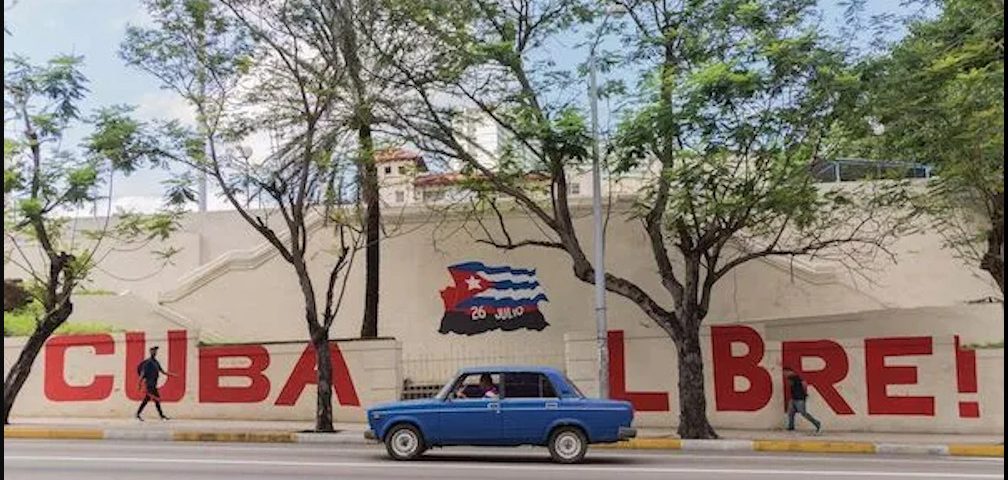by Barry Shepphard, published on Socialist Action, July 24, 2021
President Biden has not only kept all of Trump’s sanctions designed to severely harm the Cuban people, he has added two more.
His response to the July 11 protests in Cuba was to call for the overthrow of the socialist Cuban Revolution.
The July 11 protests of the Cuban government were wildly misrepresented in the major media in the U.S.
The way they were portrayed on TV would lead one to think they were tens of thousands strong. More sober on the spot estimates put the figure at hundreds, except in Havana at 2,000-3,000.
According to reports from different reliable sources, they were composed of three main elements: counter-revolutionaries calling for the overthrow of the Revolution, small groups of intellectuals protesting restrictions on artistic freedom, and working class people demanding that the government improve their living conditions.
The big majority of protesters were in the third category, and were not linked to the counter-revolutionary organizations (financed by the United States), nor were they led by them.
Without going further into what happened during the protests, they brought to light the severe economic hardships the Cuban people are suffering, including shortages of food and medicines, in the context of an economic crises exacerbated by the worldwide downturn due to the COVID pandemic.
The working class protesters were driven by the deterioration in their living conditions. They were mistaken in thinking that the culprit was the government, whatever its shortcomings.
Most of the socialist and broader left in the U.S. including Black Lives Matter has put its finger on the real culprit: the U.S. economic blockade of Cuba and the sanctions imposed on the Cuban economy, especially the new ones imposed by Donald Trump that Biden supports which are designed to starve the Cuban people into submission.
The 60-year-old blockade of Cuba was first put in place right after the Cuban Revolution began to carry out its promise of land reform, which confiscated the large landholdings of U.S. firms like the United Fruit Company.
U.S. imperialism had made the production of sugar the main pillar of the island’s economy, and that was controlled mostly by United Fruit.
The blockade was intensified as the Revolution soon deepened into a socialist revolution that confiscated all the companies owned by U.S. and Cuban capitalists.
Without going into the whole history of the blockade and resistance to it, including after the restoration of capitalism in the Soviet Union, there was an opening toward Cuba under the Obama administration.
In 2014, Obama initiated a shift away from sanctions and toward a normalization of relations. These included the repeal of the ridiculous designation of Cuba as a terrorist state, and the restoration of diplomatic relations.
Then there was an easing of restrictions on travel and remittances of money Cuban-Americans could send to relatives on the island, as well as on trade, telecommunications, banking and financial services.
The restoration of diplomatic relations led to increased government to government engagement, with over 20 agreements and numerous dialogs on issues between the U.S. and Cuba.
Trump in 2017, his first year in office, jettisoned Obama’s opening, and imposed new sanctions on the Cuban economy, which were increased each year. In 2019 sanctions were imposed on shipping companies and vessels that transported oil from Venezuela to Cuba and the Cuban oil import-export company, a big setback.
In the same year, a cap of $1,000 per quarter of each year was placed on remittances, and then the threat of sanctions forced Western Union to stop processing all remittances, effectively cancelling them.
He eliminated people-to-people educational travel, and prohibited cruise ships, private corporate aircraft, sailboats and fishing boats from going to Cuba.
Commercial flights to Cuba were suspended to cities other than Havana. U.S. travelers to Cuba were barred from staying at 400 hotels which visitors often used, or in private residences of Cuban officials.
This is just a partial list.
One effect of Trump’s actions has to cripple tourism, a major source of income for Cuba, then made worse by the pandemic.
On January 11, 2021, just before Biden look office, Trump placed an additional 243 sanctions on Cuba, the full extent of which is unknown.
Included was placing Cuba back on the list of terrorist states, further limiting trade, placing Cuba on its most restrictive export-licensing list, threatening other countries with sanctions, all of which had its desired effect of blocking most trade with Cuba.
These new restrictions have been so severe that medical supplies and food are now scarce. Cuba had been a leader internationally on dealing with the virus, even developing its own vaccines. But now its vaccination program has been stalled by lack of medical supplies, including syringes.Washington is not just attempting to starve Cubans into submission but also to make them sick for the same purpose.
Biden had promised during his presidential campaign to lift Trump’s sanctions, but he hasn’t even reversed Trump’s January 11 actions, and added to them.
It is clear that Washington will not go back to the kind of opening Obama made, but the opposite.
Biden’s budget proposals now before Congress include $20 million for backing counterrevolutionary groups in Cuba, and other efforts at destabilizing the regime. Another $13 million is authorized for broadcasting U.S. propaganda of the type that shifted blame for Cuba’s economic crisis from the U.S. blockade and sanctions.
Many Cubans can get these broadcasts.
Elementary humanity, let alone opposition to U.S. imperialism and for democracy, demands that the U.S. blockade and sanctions be lifted now!
Let the Cuban people live!
All Out in Washington, D.C., July 25!
U.S. Hands Off Cuba!
*Featured Image: La Habana, Cuba Mural in Havana. Photo by Yerson Olivares on Unsplash
